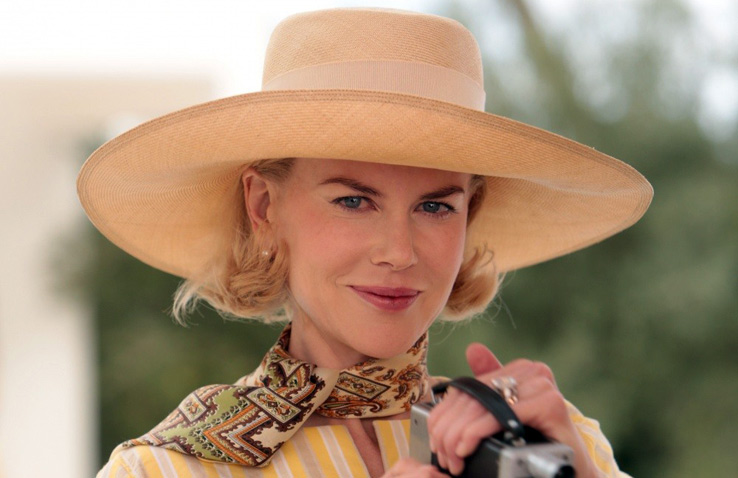
Festival openers are always tricky: you want to start off your celebration of film on the right note, but ideally with a certain amount of glitz and glamour
too. Cannes has had a pretty good run the last few year, with “Midnight In Paris,” “Moonrise Kingdom” and “ The Great Gatsby” all kicking things off with a bang. And on paper, this year’s opener “Grace Of Monaco” seemed to have
all the right stuff: a major movie star, Nicole Kidman, playing another major movie star, Grace Kelly, in a biopic with local French Riviera appeal, and
directed by Olivier Dahan, who only a few years back helmed “La Vie En Rose,” which won Marion Cotillard
her Oscar.
‘Grace’ has certainly earned its place in the hall-of-fame for Cannes openers, but not in the way it presumably wanted to. Even by the standards of recent
Royal biopics “W.E.” and “Diana,” it’s something of a disaster: rarely competent, unintentionally hilarious and
borderline reprehensible in both its politics and its take on gender roles. It’s unlikely to be forgotten in a hurry.

After a brief introduction in 1956 as Kelly wraps her final role, the film picks up in 1961, with the one-time Hollywood star now married to Prince Rainier
of Monaco (Tim Roth) with two children. Alfred Hitchcock (Roger Ashton-Griffiths) is trying to lure her back to acting
to star in his film, “Marnie,” and Rainier initially seems supportive. But a crisis is looming: the zero tax scheme that Rainier has set up
to restore the country’s fortunes have angered Charles De Gaulle’s French government, who are threatening embargo and even invasion against the tiny
nation. In the end, it might be the semi-reluctant princess who could decide the fate of the country…
Already condemned by the Monaco royal family, the film opens with a quote explaining that the film is “a fictional account inspired by real events,” but it
might have been more honest if it had said “a fictional account inspired by the Oscar-winning success of ‘The King’s Speech’ ”—the film’s
arc, as Kelly must embrace her royal role to save the day, feels lifted almost straight from Tom Hooper’s global smash. That Princess Grace is standing up
for Monaco’s right to be a tax haven for the super-rich, rather than preparing the nation for war against Hitler, doesn’t seem to have struck anyone
involved as a problem.

The other thing that “The King’s Speech” had going for it? A basic level of filmmaking competence. Some of Dahan’s choices, like seemingly smearing
Vaseline over the lens for every shot, could be put down to matters of taste. Others, like the DoP occasionally appearing to forget to light reverse
angles, like an atrocious, heavy-handed score by Christopher Gunning, like editing that seems to want to not so much assemble scenes as
collect series of reaction shots, and most memorably, like extended close-ups on Kidman that search around her head like a drunken rostrum camera operator,
feel more like the result of someone who hasn’t directed, or seen, a movie before.
It also goes through some extraordinary tonal lurches: the film jumps from a bizarre, frothy extended makeover montage featuring Derek Jacobi and a parrot, to a kind of bizarre, tepid spy thriller, Dahan mostly just throwing shit at the wall (split screens! A random
Indiana Jones map!) and keeping his fingers crossed. By the time Kidman’s endless final speech rolls around, though, you’ve already checked out long ago.

It’s not like this feels like a botched version of potentially interesting material, either. The film’s fundamentally regressive when it comes to the
gender politics of Grace’s arc. Her decision to give up her acting career to stay with a husband who married her partly out of convenience and never seems
to particularly love her is treated as a heroic act (“Real love is obligation,” as Frank Langella’s Catholic sensei tells her at one
point). The individual scenes are pretty rotten, too. Accidental chuckles ensue as a series of characters all start speaking with their job titles: “As
your press officer…” “As the Minister for the Interior…” etc., etc.
The actors mostly seem to be aware of it too. Roth often looks to be in physical pain having to say some of the dialogue, and many of the actors appear
distracted in scenes, which is fine, as Dahan often seems distracted too, going into sequences with 30-second pans presumably intended to show off the
scenery. Even the lead actress doesn’t get much of a showcase here: you never see Grace Kelly on screen, only Kidman, and she’s left adrift by the
schizophrenic material.
Occasionally, like with something like “The Happening” or “The Room,” you start to convince yourself that Dahan and co.
are in on the joke, and have stealthily made a full-on comedy. Then another scene rolls around, and it becomes clear just how lacking in self-awareness the
movie really is. And it’s hard to warm to the movie as a potential cult classic, given the sour taste left by the film’s gender politics, and general
politics. The film made headlines due to conflicts between the director and Harvey Weinstein, but for once, we’d be tempted to side with Harvey
Scissorhands, because it’s hard to see how his edit of the film could be any worse than this one. [F]
Browse through all our coverage of the 2014 Cannes Film Festival by clicking here.

